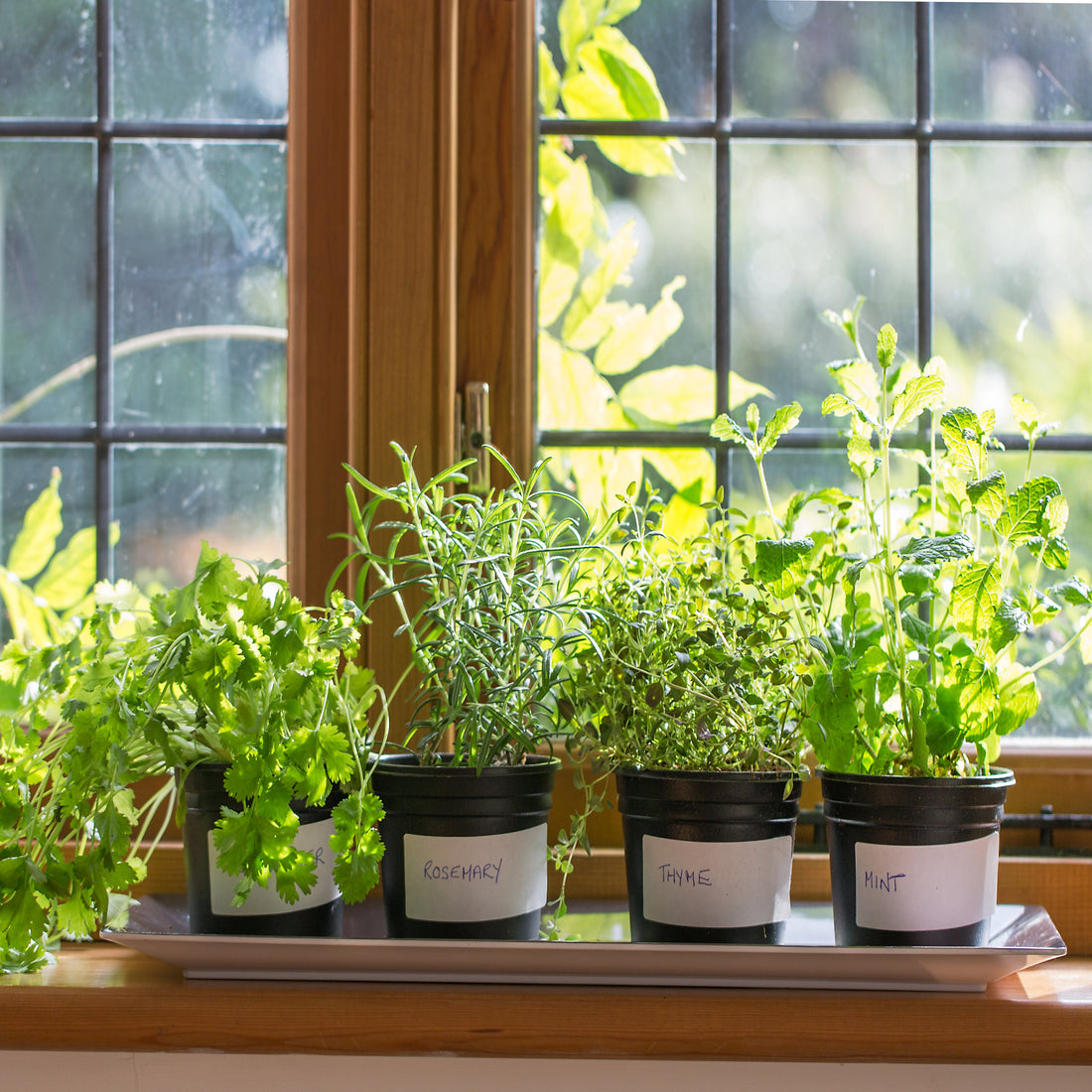How to Grow Herbs in Small Spaces: Grandmother's Guide to Fresh and Flavorful Herbs

Share
Grandmother's Guide to Growing Herbs in Small Spaces: Fresh and Flavorful Herbs at Home
I’ve always found comfort in having fresh herbs growing around me, whether it's in my kitchen windowsill or just outside my back door. There’s something deeply satisfying about snipping a few sprigs of rosemary or basil to add to a dish, knowing it was grown with care right at home. Over the years, I’ve learned how to maximize small spaces to cultivate a variety of herbs, ensuring that I always have a supply of fresh flavors to elevate my cooking. Whether you have a sprawling garden or just a sunny windowsill, growing your own herbs is not only possible but incredibly rewarding. Let me share with you my tips and tricks for creating a thriving herb garden, even in the tiniest of spaces.
The Benefits of Growing Herbs in Small Spaces
Growing herbs at home provides numerous benefits. Fresh herbs enhance the flavor of your meals, offer medicinal properties, and add a touch of greenery to your living space. Plus, gardening can be a relaxing and rewarding hobby.
Freshness and Flavor: Nothing beats the taste of fresh herbs picked right from your garden. They can significantly elevate the flavors of your dishes.
Cost-Effective: Growing your own herbs is much cheaper than buying fresh herbs from the store. A single packet of seeds can provide a continuous supply of herbs.
Convenience: Having fresh herbs readily available at home saves time and enhances your cooking experience.
Health Benefits: Herbs are packed with vitamins, minerals, and antioxidants. Growing them at home ensures they are free from pesticides and other chemicals.
Aesthetic Appeal: Herb gardens can beautify your living space, adding a touch of nature to your home environment.
Choosing the Right Herbs
When space is limited, it's essential to choose herbs that thrive in small containers or confined spaces. Here are some excellent options:
Basil
Sunlight: Full sun
Water: Regular watering
Tip: Pinch off the flower buds to encourage more leaf growth.
Chives
Sunlight: Full sun to partial shade
Water: Moderate watering
Tip: Snip the leaves often to keep the plant productive.
Mint
Sunlight: Partial shade
Water: Regular watering
Tip: Grow mint in a pot to prevent it from spreading too much.
Parsley
Sunlight: Full sun to partial shade
Water: Keep the soil moist
Tip: Harvest the outer leaves first to allow new growth in the center.
Thyme
Sunlight: Full sun
Water: Infrequent watering
Tip: Thyme thrives in dry conditions and doesn’t need much water.
Rosemary
Sunlight: Full sun
Water: Allow soil to dry between waterings
Tip: Rosemary is a hardy herb that does well in pots.
Creative Ways to Grow Herbs in Small Spaces
Grandmother's Tip: Utilize vertical space by creating a vertical herb garden. This method maximizes your growing area and adds a decorative element to your home.
Windowsill Herb Garden: Place small pots or mason jars filled with herbs on a sunny windowsill. This setup provides easy access to fresh herbs while cooking.
Hanging Herb Planters: Use hanging planters or baskets to grow herbs in areas with limited floor space. Hang them near a sunny window or on a balcony.
Vertical Herb Wall: Install a vertical garden using wall-mounted planters or a trellis system. This method allows you to grow multiple herbs in a compact area.
Herb Spiral: Create an herb spiral in your garden or patio. This design allows you to grow various herbs with different water and sunlight needs in one compact structure.
Herb Spiral Tips: Place herbs that require more sun at the top and those that need more moisture at the bottom. Use materials like stones, bricks, or wood to build the spiral structure. Ensure proper drainage to prevent waterlogging.
Pallet Herb Garden: Repurpose wooden pallets to create a vertical herb garden. Attach pots or plant directly into the pallet’s slots. This is a great way to recycle materials and save space.
Tips for Growing Healthy Herbs
Growing herbs in small spaces can be challenging, but with the right care, your plants will thrive.
Grandmother's Tip: Regularly harvest your herbs to encourage new growth and prevent them from becoming leggy.
Proper Drainage: Ensure your pots have good drainage to prevent waterlogging, which can lead to root rot.
Soil Quality: Use a high-quality potting mix that provides good aeration and nutrients for your herbs.
Watering: Water your herbs consistently, but avoid over-watering. Most herbs prefer the soil to be slightly dry between waterings.
Sunlight: Place your herbs in a location where they receive adequate sunlight. Most herbs need at least 6 hours of sunlight per day.
Pest Control: Keep an eye out for pests and use natural remedies, such as neem oil or garlic spray, to protect your plants.
Troubleshooting Common Issues
Growing herbs in small spaces can sometimes present challenges. Here are solutions to common problems:
Pests: Use natural pest deterrents like neem oil, insecticidal soap, or companion planting with pest-repelling herbs such as basil or marigold.
Over-watering: Ensure pots have proper drainage and avoid watering too frequently. Allow the soil to dry slightly between waterings.
Under-watering: Regularly check soil moisture and water when the top inch of soil feels dry. Mulch can help retain moisture.
Insufficient Light: Move your herbs to a sunnier spot or use grow lights to supplement natural light. LED grow lights are energy-efficient and effective for indoor gardening.
Nutrient Deficiency: Use a balanced, water-soluble fertilizer every few weeks to provide essential nutrients. Organic options like compost tea or fish emulsion are excellent choices.
Advanced Tips for Small Space Herb Gardening
To take your small space herb garden to the next level, consider these advanced tips:
Grandmother's Tip: Rotate your herb plants regularly to ensure even growth and exposure to sunlight.
Self-Watering Planters: Invest in self-watering planters to reduce the frequency of watering and maintain consistent moisture levels.
Hydroponic Systems: Explore hydroponic gardening for growing herbs without soil. This method can be highly efficient and space-saving.
Companion Planting: Pair compatible herbs together to enhance growth and repel pests. For example, basil and tomatoes grow well together, as do rosemary and beans.
Pruning Techniques: Learn proper pruning techniques to promote bushier growth and prevent herbs from flowering too early.
Using Recycled Materials: Be creative and use recycled materials like old cans, jars, or even shoes as planters. This not only saves money but also adds a unique touch to your garden.
Indoor Herb Garden Kits: Consider using indoor herb garden kits that come with everything you need, including pots, soil, seeds, and grow lights. These kits are convenient and beginner-friendly.
Seasonal Care for Your Herb Garden
Caring for your herb garden throughout the year ensures healthy growth and bountiful harvests:
Spring and Summer: Increase watering frequency as temperatures rise. Fertilize regularly to support rapid growth. Watch for pests and treat promptly.
Fall and Winter: Move potted herbs indoors to protect them from frost. Reduce watering and avoid fertilizing as growth slows. Provide adequate light with grow lights or place herbs in a bright, sunny window.
Year-Round Care: Rotate pots to ensure even light distribution. Clean leaves and stems to prevent dust buildup and pests. Harvest herbs regularly to encourage new growth and maintain plant health.
By incorporating these tips and creative ideas, you can enjoy a thriving herb garden even in the smallest of spaces. Growing your own herbs at home is a rewarding and sustainable way to enhance your cooking and bring a touch of nature indoors. Start your herb garden today and experience the joy of fresh, flavorful herbs at your fingertips.
With these practical tips and creative solutions, you'll be well on your way to growing a beautiful and productive herb garden, no matter how limited your space may be. Happy gardening!


